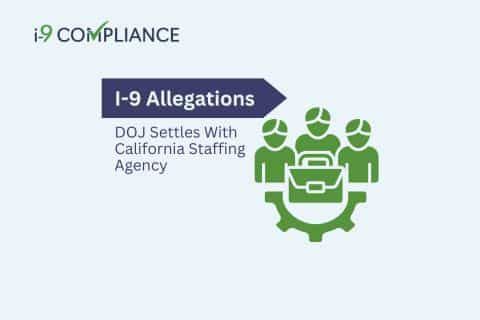DOJ Settles I-9 Allegations With California Staffing Agency

The US Department of Justice (DOJ) announced a recent settlement agreement with a California-based staffing agency. This agreement resolved the DOJ’s discrimination claims against the employer’s predecessor company. According to the DOJ, the predecessor company violated the Immigration and Nationality Act (INA) when verifying workers’ eligibility to work in the United States.
The DOJ launched its investigation on October 12, 2021, after the employer received a letter concerning an independent investigation. According to the letter, the investigation would determine whether they engaged in unfair employment practices under the INA. Based on the results, the organization had a pattern of unfair documentary practices between September 2020 and October 2022.
The organization’s offices in Bell and Ontario, California, routinely required specific documents from noncitizens with work authorization and lawful permanent residents. According to the DOJ, the company requested documents from List A to complete the employment eligibility verification process (Form I-9). However, they did not maintain this practice for all employees. For example, US citizens could present any acceptable document, not just ones listed on List A.
Federal law allows employees to offer any legally acceptable document as proof of their identity and work authorization. This law specifically does not include a person’s citizenship or immigration status in the process. This expectation applies to all US citizens and nationals, lawful permanent residents, asylees and refugees, and others with legal permission to work in the US.
According to Assistant Attorney General Kristen Clarke of the DOJ’s Civil Rights Division, “Employers cannot demand specific documents from workers because of their citizenship status when checking their permission to work. The Civil Rights Division is committed to protecting workers from discriminatory practices that create unnecessary barriers to employment.”
Though the investigation revealed that the original employer no longer existed, it also found another organization that became the legal successor. As such, this organization became liable for the Form I-9 violations. According to the settlement, the successor must pay $46,050 in civil penalties, provide HR personnel with additional training, comply with INA requirements, and post a copy of the Form I-9 Lists of Acceptable Documents. The company also agreed to:
- “Honor documentation that on its face reasonably appears to be genuine, relates to the person, and satisfies the requirements of 8 USC § 1324a(b);
- Not request more or different documents than are required by law for the EEV process; and
- Permit all employees to present any document or combination of documents acceptable by law both at initial hire and during any lawful reverification of continued employment authorization.”
As this event shows, the employment eligibility verification process can be challenging for any organization, but an electronic I-9 management system can help. This system can provide a complete framework for completing the verification and reverification process, guarantee simple digital storage for all forms and documentation, and an optional E-Verify integration.
Learn more about automating your employment eligibility verification and ensuring compliance with I-9Compliance.